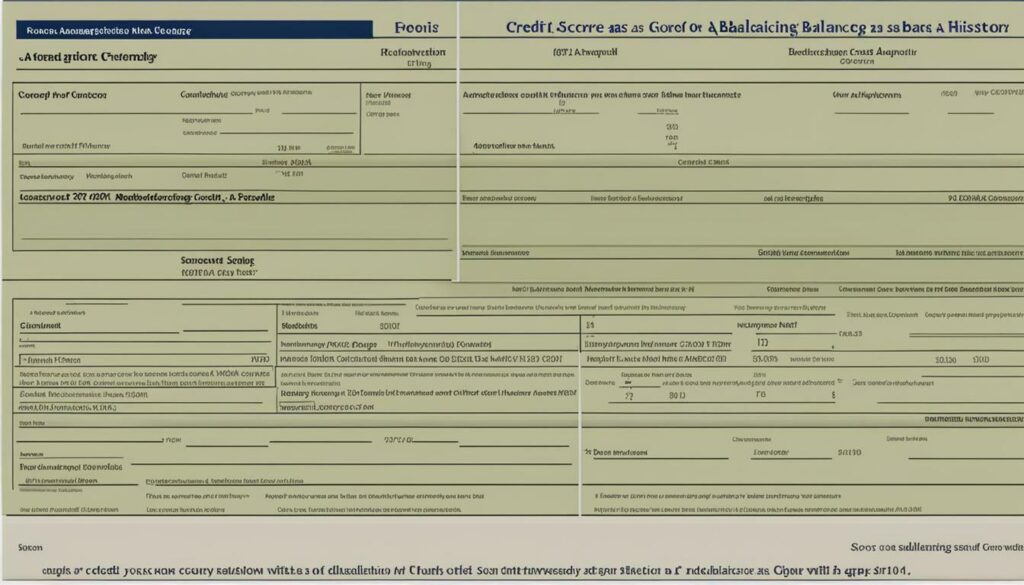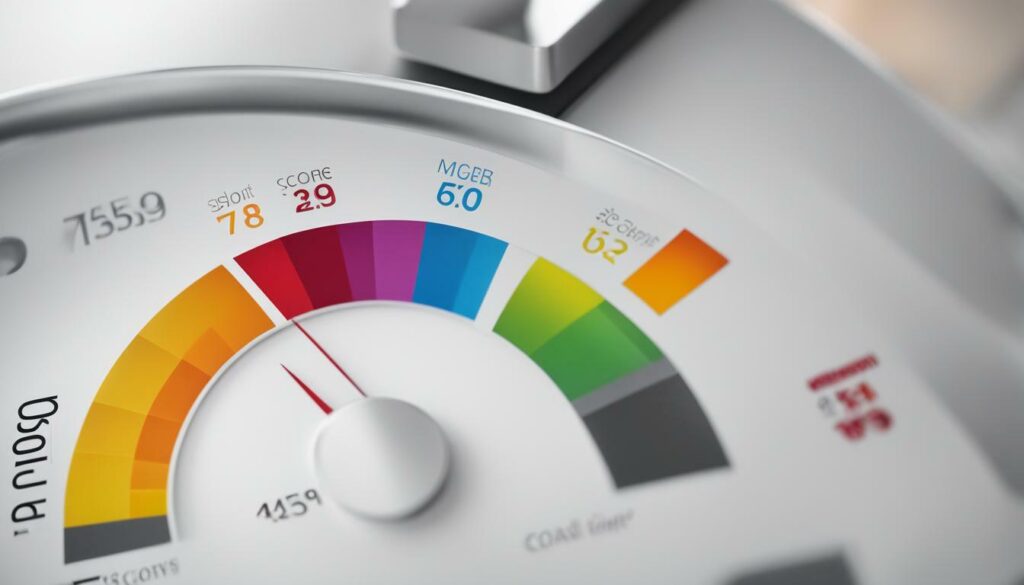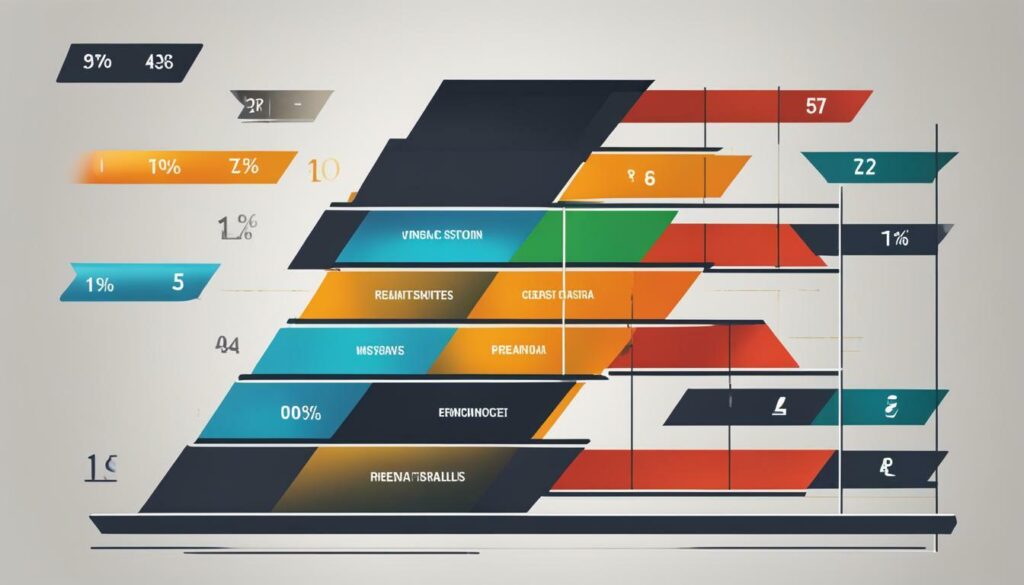Understand Credit Score Considerations When Applying for a Mortgage

When applying for a mortgage, your credit score plays a crucial role in determining your eligibility and the terms of your loan. Lenders rely on credit reports and scores to assess your creditworthiness and decide whether to approve your mortgage application. Your credit score also influences the interest rates offered by lenders, which directly impacts the overall cost of your loan.
Key Takeaways:
- Your credit score is an essential factor that lenders consider when evaluating your mortgage application.
- Checking your credit reports regularly and fixing any errors can help improve your creditworthiness and increase your chances of mortgage approval.
- Different types of loans have varying minimum credit score requirements, so it’s crucial to understand the specific requirements for the loan you are applying for.
- In addition to credit score, lenders also consider factors such as income, debt-to-income ratio, down payment, savings, and employment history.
- Improving and maintaining a good credit history can lead to more favorable terms and lower interest rates on your mortgage.
Understanding credit score considerations when applying for a mortgage is vital to ensure a smooth and successful loan application process. By being proactive in managing your credit and maintaining a strong credit profile, you can increase your chances of mortgage approval and secure more favorable terms.
Why Credit Score Matters in Mortgage Applications
Your credit score has a direct impact on your ability to secure a mortgage, as well as the terms and interest rates that lenders are willing to offer you. Understanding why credit score matters in mortgage applications is crucial for anyone planning to buy a home or refinance their existing mortgage.
When you apply for a mortgage, lenders will pull your credit reports from the three major credit bureaus – Equifax, Experian, and TransUnion – and assess your creditworthiness based on your credit score and credit history. These factors help lenders determine the level of risk associated with lending you money.
🚨 TUIC Errors + Low Credit Score?
CreditScoreIQ helps you build credit faster by reporting utility bills to all 3 bureaus—while you dispute errors.
Start Building Credit Today →Based on your credit score, lenders will decide whether to approve your mortgage application and what interest rate to offer you. A higher credit score indicates that you are a responsible borrower who is less likely to default on your loan, making you a more attractive candidate for lenders. On the other hand, a lower credit score may result in higher interest rates or even rejection of your application.
- Conventional mortgages typically require a minimum credit score of 620.
- FHA loans may be more lenient, with a minimum credit score requirement of 580.
- VA loans have no set minimum score requirement, but Rocket Mortgage requires a minimum score of 580.
- USDA loans and jumbo loans also have their own credit score requirements.
It’s important to note that credit score is not the only factor lenders consider when evaluating mortgage applications. They will also assess your income, debt-to-income ratio, down payment amount, savings, and employment history to get a comprehensive view of your financial situation. However, your credit score plays a significant role in the decision-making process.
To improve your chances of mortgage approval and secure more favorable terms, it’s essential to work on improving your credit score before applying for a loan. Regularly reviewing your credit report for errors and taking steps to fix them can help ensure an accurate assessment of your creditworthiness. Maintaining a good credit history by making timely bill payments, managing your debt effectively, and building positive credit habits will contribute to a stronger credit profile.
| Loan Type | Minimum Credit Score Requirement |
|---|---|
| Conventional Mortgages | 620 |
| FHA Loans | 580 |
| VA Loans | No set minimum score requirement, but Rocket Mortgage requires a minimum score of 580 |
| USDA Loans | Specific credit score requirements |
| Jumbo Loans | Specific credit score requirements |

Before applying for a mortgage, it’s essential to review your credit reports for any errors or discrepancies that may negatively impact your creditworthiness. Your credit report contains important information about your credit history, including your payment history, total debt, and any negative marks such as late payments or collections. Lenders use this information to assess your creditworthiness and determine the terms of your mortgage.
To check your credit reports, you can request free copies from the three major credit bureaus: Equifax, Experian, and TransUnion. Carefully review each report for inaccuracies, such as accounts that aren’t yours, incorrect payment information, or outdated personal information. Any errors on your credit report should be addressed promptly to ensure an accurate assessment of your creditworthiness.
If you find any errors, you can dispute them with the respective credit bureau. Provide supporting documents and explain the nature of the error clearly. The credit bureau will investigate your dispute and make corrections if necessary. It’s important to regularly monitor your credit reports and address any errors promptly, as they can have a significant impact on your creditworthiness and ability to secure a mortgage with favorable terms.
| Credit Bureau | Website | Phone Number |
|---|---|---|
| Equifax | www.equifax.com | 1-800-685-1111 |
| Experian | www.experian.com | 1-888-397-3742 |
| TransUnion | www.transunion.com | 1-800-916-8800 |

It’s crucial to fix any errors on your credit report as they can impact your creditworthiness and the terms of your mortgage. Taking the time to review and address any inaccuracies can save you money and help you secure a mortgage that aligns with your financial goals.
Remember, maintaining accurate credit reports is essential for a healthy credit history and ensuring fair assessment by lenders. Regularly review your credit reports, address any errors promptly, and adopt responsible credit habits to build and maintain strong credit. This will not only increase your chances of mortgage approval but also help you achieve your long-term financial goals.
Minimum Credit Score Requirements for Different Loans
Different types of loans have different minimum credit score requirements, and understanding these requirements is crucial when applying for a mortgage. Lenders assess your creditworthiness by reviewing your credit reports and scores, which play a significant role in determining your loan eligibility and the interest rates you are offered. It is important to be aware of the minimum credit score requirements for various loan options to ensure you meet the necessary criteria.
For conventional mortgages, which are not insured or guaranteed by the government, the minimum credit score requirement is typically 620. This means that lenders generally prefer borrowers with a credit score of 620 or higher to qualify for a conventional mortgage. However, it’s important to note that the exact requirements may vary between lenders, so it’s advisable to check with individual lenders for their specific criteria.
On the other hand, government-backed loan programs like FHA loans, VA loans, and USDA loans have their own minimum credit score requirements. For FHA loans, the minimum credit score requirement is 580, while VA loans have no set minimum score requirement. However, lenders like Rocket Mortgage require a minimum credit score of 580 for VA loans. USDA loans may have different credit score requirements depending on the lender and the specific loan program.
Jumbo loans, which are loans that exceed the conforming loan limits set by Fannie Mae and Freddie Mac, also have their own credit score requirements. The minimum credit score requirement for jumbo loans can vary widely depending on the lender and the loan amount. It’s important to consult with lenders specializing in jumbo loans to understand their specific credit score requirements.

- Understanding the minimum credit score requirements for different types of loans is essential when applying for a mortgage.
- Conventional mortgages typically require a minimum credit score of 620, while FHA loans require a minimum score of 580.
- VA loans have no set minimum score requirement, but certain lenders may have their own minimum credit score criteria, such as Rocket Mortgage’s requirement of 580.
- USDA loans and jumbo loans also have their own credit score requirements that may vary between lenders.
- It’s important to review these requirements and work on improving your credit score to increase your chances of mortgage approval and secure more favorable terms.
Consulting with a mortgage professional can provide more specific guidance on the minimum credit score requirements for your desired loan type and help you understand the steps you need to take to qualify for a mortgage.
| Loan Type | Minimum Credit Score Requirement |
|---|---|
| Conventional mortgages | 620 |
| FHA loans | 580 |
| VA loans | No set requirement, but Rocket Mortgage requires 580 |
| USDA loans | Varies depending on lender and loan program |
| Jumbo loans | Varies depending on lender and loan amount |
Other Factors Considered by Lenders
In addition to your credit score, lenders also take into account various factors such as income, down payment, and employment history to assess your overall financial stability. These factors play a crucial role in determining your loan eligibility and the interest rates offered to you.
One of the key factors considered by lenders is your income. They want to ensure that you have a steady and reliable source of income to make timely mortgage payments. Lenders will evaluate your income stability, consistency, and the likelihood of future income growth. Having a higher income can improve your chances of approval and potentially help you qualify for a larger loan amount.
The debt-to-income ratio is another important aspect that lenders consider. This ratio compares your monthly debt payments to your gross monthly income. Lenders use this ratio to assess your ability to manage your existing debts and take on additional debt. It is generally recommended to have a lower debt-to-income ratio, as it indicates a lower risk for the lender.
Down payment and savings are also significant factors in the mortgage application process. A larger down payment shows the lender that you have the financial means to make a substantial investment in the property. It also reduces the lender’s risk, which can result in a more favorable interest rate. Additionally, having savings demonstrates financial responsibility and a safety net in case of unforeseen expenses.
| Loan Type | Credit Score Requirements |
|---|---|
| Conventional Mortgages | Minimum score of 620 |
| FHA Loans | Minimum score of 580 |
| VA Loans | No set minimum score requirement, but Rocket Mortgage requires a minimum score of 580 |
| USDA Loans | Credit score requirements vary by lender |
| Jumbo Loans | Credit score requirements vary by lender |
Finally, your employment history is an essential factor considered by lenders. They want to see that you have a stable job and a consistent income stream. Typically, lenders prefer borrowers who have been employed for at least two years with the same employer or within the same industry. Changing jobs frequently or having gaps in employment may raise concerns for lenders.
Understanding these additional factors and their impact on your mortgage application can help you prepare and increase your chances of approval. By maintaining a strong financial profile with a good credit score, stable income, sufficient down payment, and a solid employment history, you can demonstrate your financial stability and improve your chances of securing a mortgage with competitive rates.

Improving your credit score before applying for a mortgage is crucial as it can greatly enhance your chances of approval and enable you to qualify for more favorable loan terms. Lenders rely on credit reports and scores to assess your creditworthiness and determine the interest rates they offer. A higher credit score not only increases your likelihood of mortgage approval but also opens doors to better loan options with lower interest rates and more favorable terms.
One effective way to improve your credit score is by checking your credit reports for errors and taking steps to fix them. Inaccurate information can negatively impact your creditworthiness, so it’s important to review your reports regularly and dispute any errors you find. Clearing up these discrepancies can result in a higher credit score and improve your overall financial profile.
Additionally, maintaining a good credit history is essential for building and maintaining strong credit. This includes making timely payments on all your debts, keeping your credit utilization ratio low, and managing your overall debt responsibly. By demonstrating responsible credit behavior, you can gradually improve your credit score and boost your chances of mortgage approval.

| Loan Type | Minimum Credit Score Requirement |
|---|---|
| Conventional Mortgages | 620 |
| FHA Loans | 580 (Rocket Mortgage requires 580+) |
| VA Loans | No set minimum requirement (Rocket Mortgage requires 580+) |
| USDA Loans | Varies by lender |
| Jumbo Loans | Varies by lender |
Aside from credit score, lenders also consider other factors when evaluating mortgage applications. These include your income, debt-to-income ratio, down payment amount, savings, and employment history. It’s important to showcase stability and financial responsibility in these areas to strengthen your overall mortgage application.
By understanding credit score considerations and taking steps to improve your credit, you can position yourself for mortgage approval and secure more favorable loan terms. Regularly reviewing your credit report, maintaining a good credit history, and building and maintaining strong credit are all important components of the process. With proper credit management, you can increase your chances of mortgage success and pave the way for a better financial future.
Maintaining a Good Credit History
Maintaining a good credit history is essential for long-term financial stability, and regularly reviewing your credit report is a key step in achieving this. Your credit report contains important information about your creditworthiness, including your payment history, outstanding debts, and any negative marks. By reviewing your credit report, you can ensure its accuracy and address any errors or discrepancies that may affect your credit score.
One way to review your credit report is by obtaining a free copy from each of the three major credit bureaus – Equifax, Experian, and TransUnion. You are entitled to one free report from each bureau every 12 months. By checking your credit report from all three bureaus, you can have a comprehensive view of your credit history and identify any potential issues.
When reviewing your credit report, pay close attention to any errors, such as incorrect personal information, accounts that do not belong to you, or late payments that you believe were made on time. If you find any errors, you should promptly dispute them with the credit bureau to have them corrected. This can help improve your credit score and ensure that lenders have an accurate representation of your creditworthiness when evaluating your mortgage application.
| What to Look for When Reviewing Your Credit Report | Why It’s Important |
|---|---|
| Personal Information | Errors in personal information can lead to mix-ups in your credit file and affect your creditworthiness. |
| Accounts and Balances | Checking the accuracy of your accounts and balances helps ensure that you are aware of all your debts and that they are being reported correctly. |
| Payment History | Reviewing your payment history allows you to verify that all payments have been reported accurately and identify any late or missed payments that may be negatively impacting your credit score. |
| Public Records | Checking for any bankruptcies, tax liens, or other public records can help you address any issues that may be adversely affecting your creditworthiness. |
Building Credit Responsibly
Building and maintaining good credit involves more than just reviewing your credit report. It requires responsible credit management and diligent credit-building strategies. Here are some tips to help you build and maintain strong credit:
- Pay your bills on time to establish a positive payment history.
- Keep your credit utilization ratio low by not maxing out your credit cards.
- Diversify your credit mix by having a mix of different types of credit accounts, such as credit cards, loans, and a mortgage.
- Avoid applying for multiple credit accounts within a short period, as it can negatively impact your credit score.
- Monitor your credit regularly to detect any fraudulent activity or unauthorized accounts.
By following these tips and regularly reviewing your credit report, you can maintain a good credit history and increase your chances of securing a mortgage with favorable terms. Remember, building and maintaining strong credit is a lifelong process that requires discipline and responsible financial habits.

Building and maintaining strong credit is crucial not only for mortgage approval but for overall financial well-being. Your credit score plays a significant role in determining your eligibility for a mortgage and the interest rates you’ll be offered. To ensure you are on the right path towards a strong credit history, here are some strategies to consider:
1. Establish a Credit History
If you’re just starting out or have limited credit history, it’s important to establish credit responsibly. Open a credit card and use it wisely, making sure to pay off the balance in full each month. This demonstrates your ability to manage credit responsibly and helps build a positive credit history.
2. Pay Bills on Time
One of the most important factors in maintaining strong credit is paying your bills on time. Late payments can have a negative impact on your credit score and remain on your credit report for several years. Set up payment reminders or automatic payments to ensure timely payments and avoid any unnecessary negative marks on your credit report.
3. Keep Credit Utilization Low
Credit utilization refers to the percentage of your available credit that you are using. It’s generally recommended to keep your credit utilization below 30% to maintain a good credit score. This means that if you have a credit limit of $10,000, you should aim to keep your balance below $3,000. High credit utilization can indicate financial strain and may negatively impact your credit score.
4. Monitor and Review Your Credit Report
Regularly monitor your credit report to ensure its accuracy and identify any potential errors or fraudulent activity. You are entitled to one free credit report from each of the three major credit bureaus annually. Take advantage of this and review your credit report for any discrepancies. If you notice any errors, report them to the credit bureaus and take the necessary steps to rectify them.
By following these strategies, you can build and maintain strong credit, which not only improves your chances of mortgage approval but also provides you with more favorable terms and interest rates. Remember, building credit is a long-term process, so be patient and consistent in your efforts.

Your credit score has a direct impact on the interest rates offered by mortgage lenders, with higher scores often leading to more competitive rates and potential long-term savings. Mortgage interest rates can vary significantly based on creditworthiness, and even a small difference in percentage points can have a significant impact on your monthly payments and the overall cost of your loan.
When lenders evaluate your mortgage application, they consider your credit score as an indicator of your creditworthiness. A higher credit score demonstrates a lower risk to lenders, making you an attractive borrower. As a result, you may qualify for lower interest rates and more favorable loan terms. On the other hand, a lower credit score may lead to higher interest rates or even loan denial.
To put it into perspective, let’s take a look at an example. Suppose you’re applying for a 30-year fixed-rate mortgage of $250,000. With a credit score of 700, you may be offered an interest rate of 3.5%. This would result in a monthly payment of approximately $1,123 and a total payment of $403,233 over the life of the loan. However, if your credit score is 640, your interest rate might be 4.5%. This would increase your monthly payment to around $1,266 and your total payment to $455,408. The difference in interest rates can cost you over $52,000 in the long run.
Therefore, it’s essential to work on improving your credit score before applying for a mortgage. Review your credit reports regularly to ensure they are accurate and dispute any errors you find. Pay your bills on time, reduce your outstanding debt, and avoid taking on new credit accounts unnecessarily. These actions can help raise your credit score and increase your chances of securing more competitive rates and potential savings over the duration of your mortgage.

| Loan Type | Minimum Credit Score Requirement |
|---|---|
| Conventional Mortgages | 620 |
| FHA Loans | 580 |
| VA Loans (Rocket Mortgage requirement) | 580 |
| USDA Loans | Varies by lender |
| Jumbo Loans | Varies by lender |
In addition to credit score, lenders also consider other factors such as income, debt-to-income ratio, down payment, savings, and employment history. These factors contribute to the overall assessment of your financial stability and ability to repay the loan. By maintaining a good credit history and demonstrating responsible financial habits, you can improve your chances of securing a mortgage with competitive rates and achieving your homeownership goals.
Key Points:
- Your credit score plays a significant role in the interest rates offered by mortgage lenders.
- Higher credit scores often lead to more competitive rates and potential long-term savings.
- Review your credit reports regularly and take steps to improve your credit score before applying for a mortgage.
- Lenders also consider factors like income, debt-to-income ratio, down payment, savings, and employment history.
| Loan Type | Minimum Credit Score Requirement |
|---|---|
| Conventional Mortgages | 620 |
| FHA Loans | 580 |
| VA Loans (Rocket Mortgage requirement) | 580 |
| USDA Loans | Varies by lender |
| Jumbo Loans | Varies by lender |
Conclusion
Understanding credit score considerations and their impact on your mortgage application is crucial when navigating the complexities of the lending process. Lenders use your credit reports and scores to assess your creditworthiness and determine your eligibility for a mortgage. Your credit score also plays a significant role in the interest rates that lenders offer you.
Checking your credit reports for errors and taking steps to fix them is highly recommended. Inaccurate information on your credit report can negatively affect your creditworthiness, so it’s important to ensure that your credit reports are accurate and up to date.
It’s worth noting that different types of loans have different minimum credit score requirements. For example, conventional mortgages typically require a minimum credit score of 620, while FHA loans require a minimum score of 580. VA loans have no set minimum score requirement, but Rocket Mortgage requires a minimum score of 580. USDA loans and jumbo loans also have their own credit score requirements.
In addition to credit score, lenders also consider other factors such as your income, debt-to-income ratio, down payment, savings, and employment history. These factors provide a more comprehensive picture of your financial situation and help lenders assess your ability to repay the loan.
Improving your credit score before applying for a mortgage can greatly increase your chances of approval and help you secure more favorable terms. Regularly reviewing your credit report, maintaining a good credit history, and adopting habits that promote positive credit-building are all essential steps in building and maintaining strong credit.
By understanding credit score considerations and taking proactive steps to improve your credit, you can position yourself as a more attractive borrower to mortgage lenders. This can ultimately lead to securing competitive rates and saving money over the life of your loan.
FAQ
Why is understanding credit score important when applying for a mortgage?
Understanding your credit score is crucial when applying for a mortgage as lenders use credit reports and scores to determine loan eligibility and interest rates.
How can I check and fix errors in my credit report?
Checking your credit reports for errors and taking steps to fix them is advised to ensure accurate assessment of your creditworthiness.
What are the minimum credit score requirements for different types of loans?
Conventional mortgages typically require a minimum credit score of 620, FHA loans require a minimum score of 580, VA loans have no set minimum score requirement but Rocket Mortgage requires a minimum score of 580, and USDA loans and jumbo loans also have their own credit score requirements.
What other factors do lenders consider when evaluating mortgage applications?
Lenders also consider factors such as income, debt-to-income ratio, down payment, savings, and employment history.
Why is it important to improve my credit score before applying for a mortgage?
Improving your credit score before applying for a mortgage can increase your chances of approval and secure more favorable terms.
How can I maintain a good credit history?
Regularly reviewing your credit report and maintaining a good credit history are important steps for building and maintaining strong credit.
What strategies can I use to build and maintain strong credit?
Strategies for building and maintaining strong credit include responsible credit card usage, timely bill payments, and effective debt management.
How does credit score impact the interest rates offered by mortgage lenders?
Credit score plays a significant role in determining the interest rates offered by mortgage lenders. A higher credit score can help secure competitive rates and save money over the life of the loan.
Ready to Improve Your Credit?
Disputing TUIC errors is step one. Step two? Boost your score by reporting utility payments with CreditScoreIQ.
Get Started Now (Only $1 Trial) →3-bureau reporting • $1M identity insurance • Dark web monitoring






